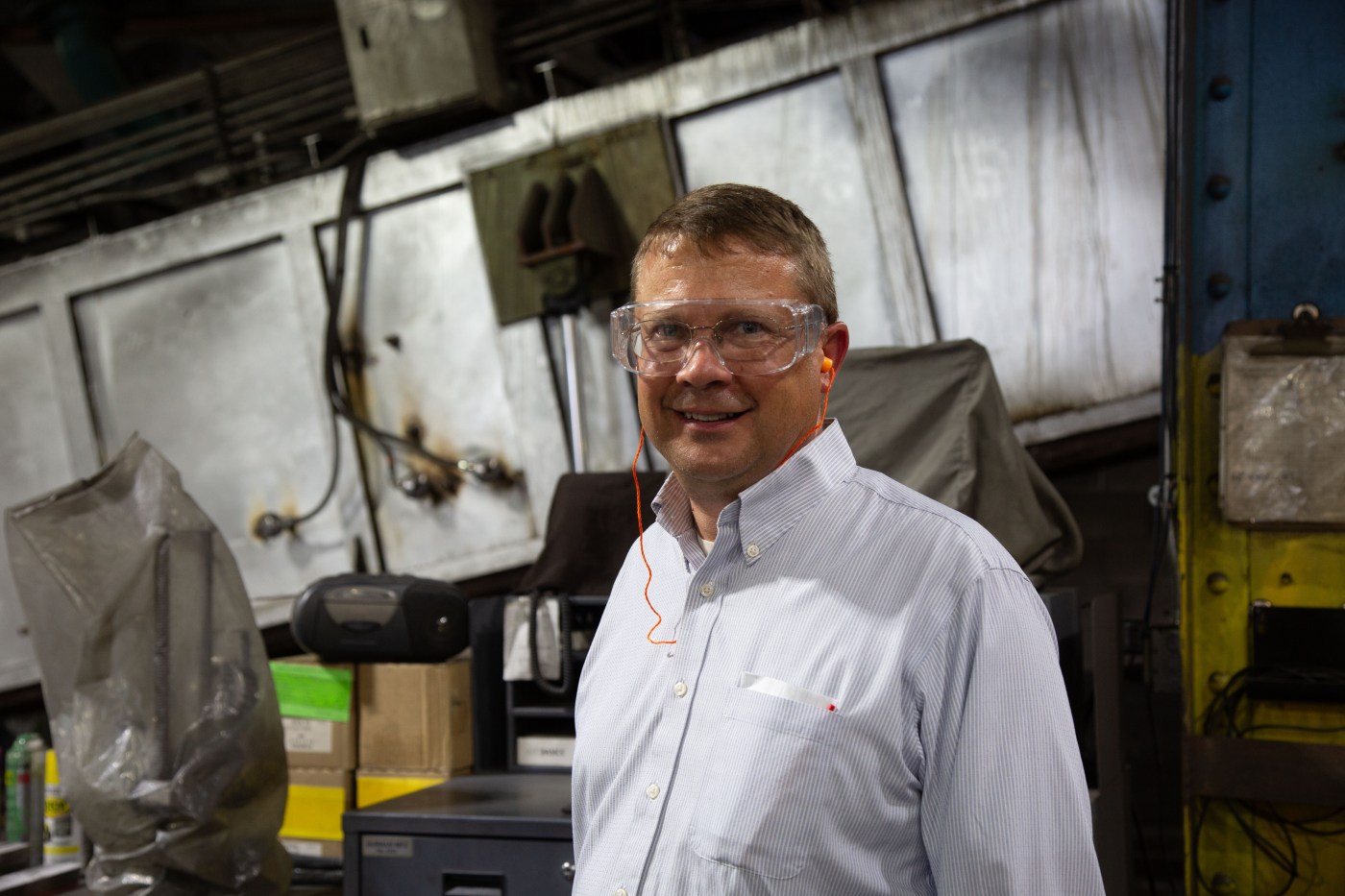
St. Paul’s Northern Iron Foundry owner hopes to expand production, reach out to the community
Alex Lawton knows the iron casting company that bears his name isn’t always favored by the neighborhood residents who live near his seven metal plants, which stretch from Minnesota to Wisconsin, Alabama and Pennsylvania. Not long after Lawton Standard acquired the Northern Iron & Machine foundry on St. Paul’s East Side two years ago, state authorities came calling, requiring greater monitoring of air quality and particulate matter in the surrounding area, among other changes.
Lawton, a fifth-generation foundry owner, said he’s ready to do more than that. On top of some $2 million in planned building and equipment improvements, he’s begun leading community tours through Northern Iron’s cavernous foundry hall off Forest Street, hoping to get current and former elected officials and other residents walking through the century-old operation that he believes is key to bringing manufacturing back to America and blue-collar union jobs back to the city’s East Side.
One side of the Northern Iron & Machine foundry abuts residential homes on Wells Street on the East Side of St. Paul, raising questions about potential health impacts for those living near the business on Thursday, Aug. 1, 2024. (Devanie Andre / Pioneer Press)
Some neighborhood advocates have already refused, expressing concern about potential health impacts from a single visit. Lawton points out that nearly 80 United Steel workers are situated out of the one foundry location north of Phalen Boulevard and Arcade Street, and some of his St. Paul employees measure their time there in decades.
“We’d like to see that headcount grow to over 100 in a few years,” said Lawton, whose privately-held company is based outside Green Bay in De Pere, Wis.
‘A little more plugged in’
Office manager Jody DeHaan’s son was 2 years old when she joined the foundry. Fast forward 34 years, and the younger DeHaan is now the final inspector on the company’s finished metal castings. Derek Marty of St. Paul, who has worked at the plant since 2004, drove past a recent tour group in a forklift sporting a drum full of copper across the factory floor.
Derek Marty works at the Northern Iron & Machine foundry in St. Paul on Thursday, Aug. 1, 2024. Marty has been working at the foundry since 2004 and was able to keep his job despite employee cuts earlier this year. (Devanie Andre / Pioneer Press)
Lawton fully acknowledges that some neighborhood and environmental advocates may never accept a foundry in their midst, even one that has operated in St. Paul since 1906.
But there’s a large residential audience situated somewhere between his entrenched critics and diehard business advocates, and he said he’s ready to make the case to them for why Northern Foundry should be accepted as part of the community, and even be allowed to expand production in place.
“It’s a mystery, right? You’ve got this big brickhouse building at the end of the block, and prior ownership was always disengaged,” said Lawton, calling Northern Iron a black box in need of demystification to the neighbors. “One of the things we can do is provide access. Why aren’t we a little more plugged in?”
Northern Iron’s PurpleAir air-quality monitors deliver emissions readings in real-time online at PurpleAir.com/maps.
The MPCA has called PurpleAir monitors outdated, and a district court judge has called for them to be replaced or supplemented.
Former St. Paul City Council member Jane Prince took a tour of Northern Iron this month and walked away impressed.
“I think the new owners are doing things right,” Prince said. “They’re really committed to meeting their neighbors and working together. These are good union jobs on the East Side.”
MPCA fine
Still, it’s been a difficult few months for Northern Iron, which just recently reversed a round of layoffs that had forced more than a dozen workers off the books, or 15% of its workforce, after state legal action temporarily limited production. The company was fined $41,000 by the Minnesota Pollution Control Agency last October for permitting and air-quality monitoring violations that occurred over the course of 15 years.
The MPCA, which appears likely to appeal a recent legal decision in the company’s favor, has declined to comment on pending litigation, though a spokesperson said in an email that “the company’s own modeling information shows emissions levels of three different pollutants far above acceptable levels established by the Clean Air Act.” Lead emissions, large particulate matter and fine particulate matter have all at times registered many times above the national standard for ambient air quality.
Lawton, who acquired Northern Iron in August 2022, has maintained that those errors transpired under previous ownership, or readings came in hot on days the foundry was not in operation. Nevertheless, the company is still on the hook for removing and replacing emission units and control equipment, failing to recertify hoods after making the changes, and operating some of its pollution-control equipment out of permitted ranges.
In its previous permit applications, the company also failed to fully list the facility’s activities that would have required it to conduct ambient air-quality modeling.
Since then, Lawton has highlighted to the courts readings from 10 company and MPCA air-quality monitors surrounding Northern Iron that show air particulate matter to hover around 30% of national air-quality standards, or 70% below limits, which Lawton calls a good thing. As for lead, “we’re about 98.6% below the lead levels,” said Lawton, calling those numbers a great thing.
“We pay a lot of taxes, we pay a lot of utilities,” he added. “We’re not a big company, but I think we matter in the ecosystem.” Until a recent judicial decision in the company’s favor, “we were on the verge of having to do another round of layoffs, not because we don’t value our people, but because we were bleeding. Everybody who wants back is back.”
Foundries under federal, neighborhood scrutiny
Some critics — including four state lawmakers who represent St. Paul’s East Side — say they’re far from convinced.
Jack Byers, executive director of the Payne-Phalen Community Council, has called on Ramsey County and the Minnesota Department of Health to get more involved in determining neighborhood health impacts related to Northern Iron, which has maintained that it is not a heavy polluter.
“There are public health concerns out there and this needs more conversation, more research, more clarity,” said Byers last month. “It has relevance in people’s lives right down on the ground. On Wells Street, right across the street from Northern Iron, there are people’s houses. This is not a factory that is out in the middle of an industrial park.”
Byers and community council chair Rebecca Nelson were invited to tour the foundry this month but declined.
“We wanted some assurance that walking in there would not have some adverse public health effect, and we were not able to get that,” Byers said.
Other foundries have also run afoul of their neighbors, with mixed consequences. The century-old Smith Foundry in the East Phillips neighborhood of Minneapolis — long a source of neighborhood air-quality concerns — was scheduled to completely shut down by mid-August, weeks after a settlement with the Environmental Protection Agency over excessive pollution discovered around the plant.
Adjacent to Frogtown Park and Farm, the St. Paul Brass and Aluminum foundry on West Minnehaha Avenue came under federal EPA investigation this year for allegedly failing to resolve issues that had been discovered by inspectors in July 2022, including underperforming filtration equipment designed to limit pollution, as well as lapses in record-keeping.
Lead, air-quality monitors
Lawton noted that the 10 lead and air-quality monitors that his company and the MPCA have installed around Northern Iron — a 180,000-square-foot facility that stretches nearly a linear quarter-mile — have generally shown air quality in the immediate area around the foundry to fall within state standards, but there have been exceptions. He pointed to a print-out of an emissions graph depicting an enormous spike in mid-May.
Alex Lawton, CEO of Lawton Standard, looks over the data that shows Northern Iron & Machine complies with rules set in place for foundries in St. Paul on Thursday, Aug. 1, 2024, amid a discussion about how the company should move forward. (Devanie Andre / Pioneer Press)
When Lawton checked, he discovered that the foundry was not in operation that day.
“We said, oh, thank God,” he recalled. The date was May 13, and it coincided with a multi-state air-quality alert related to Canadian wildfires.
Another emissions spike took place on July 4. The foundry was not in operation then either, possible evidence that the monitors were picking up residue from neighborhood fireworks.
“The only times that the monitors around the foundry showed an exceedance were days when the foundry wasn’t running,” Lawton said.
Calling some of the PurpleAir testing equipment outdated, the Minnesota Pollution Control Agency has tried to limit Northern Iron’s material processing to 10 tons per day, or roughly a third of normal 25- to 30-ton production. And until a recent decision from a Ramsey County District Court judge, the MPCA had its way for several months.
The limits, imposed in April, were rolled back last month after Judge Leonardo Castro reviewed the data himself.
“The testing we’re doing around the plant shows we’re in compliance now, actually,” said Jack McPike, Lawton Standard’s director of national operations. He ticked off a list of large, discarded items that Northern Iron melts and converts into custom metal parts for clients: shredded cars, railroad steel, car drums and rotors. Even the sand used in production is reprocessed.
“Foundries in general are one of the biggest recyclers around,” McPike said.
Court’s order
In response to legal action filed by Northern Iron and Lawton Standard, Castro delayed implementation of the MPCA tonnage restrictions until at least Nov. 18, while still requiring neighborhood air-quality monitoring. The court’s order requires Northern Iron to reduce its operations if the monitors show excessive emissions.
It also requires Northern Iron to replace or supplement existing PurpleAir community air-quality sensors with approved devices, or what the MPCA calls “regulatory monitors.” Northern Iron must submit a revised permit application by Sept. 13 that includes modeling that shows the company can process 25 tons daily without exceeding national standards for lead and particulate matter.
“At 10 tons a day, this business isn’t viable,” Lawton said. “That’s not a reason to be allowed to pollute. That’s not the grace we were looking for. But do we have to kill the business when we’re willing to move faster than normal on monitoring and improvements, and spend $2 million doing it? You order your widget from me and expect it in a month, and now I’m telling you it has to be three months.”
“We felt like it was worth the fight,” added Lawton, noting Northern Iron recently hired on a former employee of the defunct Smith Foundry. As production picks up, he’d like to add more.
For state regulators and elected officials, that may take some convincing. Four state lawmakers representing the East Side — state Reps. Liz Lee, Jay Xiong and Rick Hansen and state Sen. Foung Hawj — issued a joint statement last month urging the MPCA to appeal the judge’s ruling.
“The MPCA’s previous limitations were established to safeguard public health,” wrote the lawmakers. “We remain apprehensive that increased production could lead to higher levels of harmful air pollutants. This relaxation of environmental standards could put the health of residents, especially children, at further risk. We are calling on MPCA to appeal this unprecedented decision, and we are dedicated to ensuring that corporate interests are not prioritized over environmental protections and our resident’s health and safety.”
St. Paul City Council member Nelsie Yang, who represents the area where Northern Iron is located, and council member Cheniqua Johnson, whose district the foundry borders, both said this month that they’re monitoring discussions with local residents and were open to hearing more from all sides, though they’ve let state lawmakers take the lead for now.
Yang, who recently returned from maternity leave, called it important to balance the concerns of a union employer with public health considerations.
Lead and lawmakers
If increased scrutiny of Northern Iron’s operations has had another silver lining, so to speak, it’s been lead.
If there’s an ingredient no customer wants in its metal claw, arm or widget, it’s lead, and Lawton said his company prides itself on not delivering it, though he can’t rule out that an old railroad tie or bridge rail won’t be covered in ancient lead paint. Old metal is sandblasted clean before being melted at 2,700 degrees and processed into a new manufactured item. Multiple HEPA and cartridge filters aid that process.
“I really want to make the point that lead isn’t there,” Lawton said.
Jack McPike, director of operations for Lawton Standard, holds pellets used for blast-cleaning iron at the Northern Iron & Machine foundry in St. Paul on Thursday, Aug. 1, 2024. (Devanie Andre / Pioneer Press)
The miniscule lead readings are not just good news in his eyes. They speak, he said, to why Northern Iron should be allowed to resume normal operations and even expand. He said his goal is to be fully compliant with all state requirements for permitting, modeling and monitoring by the end of the year, and approved by state inspectors by next spring.
Lawton, who withdrew from a community meeting last May at the last minute, predicted better days ahead. He said he’d like to assemble a neighborhood advisory council to offer balanced feedback to Northern Iron. He hasn’t ruled out sponsoring a neighborhood Little League team or another such outreach effort, provided he gets some guidance.
“I don’t want to be so pretentious as to pretend to know what the community needs,” he said. “I don’t need Chamber of Commerce and the business advocates only, or just the ‘facts don’t matter’ people (on the other side). We’re just trying to open a decent channel of communication.”
Related Articles
Concert review: At the X, Hozier shows he’s just getting better with time
St. Paul woman charged in fatal Maplewood hit-and-run
4-year-old witnessed father’s South St. Paul shooting, mom says at killer’s sentencing
Obituary: Karen Hubbard, longtime St. Croix River Valley matriarch, dies
Minnesota crime numbers continue to drop, according to BCA report


